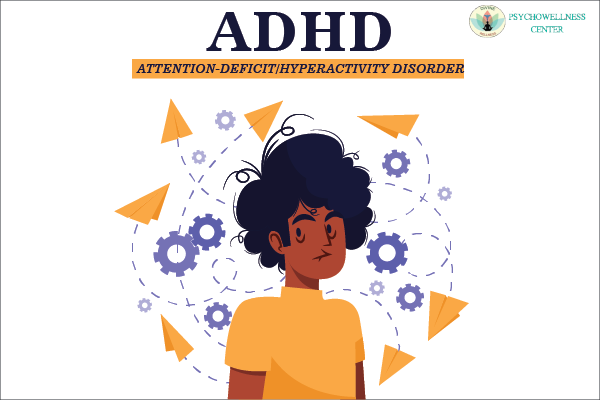In both children and adults, attention-deficit/hyperactivity disorder (ADHD) is a neurodevelopment condition. It is characterized by a pattern of hyperactivity-impulsivity and/or chronic inattention that interferes with functioning or development.
Attention-deficit/hyperactivity disorder (ADHD) is a neurodevelopmental disorder that is characterized by symptoms of inattention, hyperactivity, and impulsivity. In adults, ADHD can manifest as difficulty with organization, time management, impulsivity, and emotional regulation.
There is a growing body of research on the prevalence, diagnosis, and treatment of ADHD in adults. Studies have shown that ADHD is a common disorder in adults, with an estimated prevalence of 2-5% in the general population. However, many adults with ADHD go undiagnosed and may not receive the appropriate treatment.
In adults, ADHD symptoms often manifest differently than they do in children. For example, adults with ADHD may have a hard time starting and completing tasks, as well as difficulty with organization, time management, and planning. They may also experience impulsivity, impulsiveness, and restlessness, which can lead to problems at work or in relationships.
Although the precise origins of ADHD are not entirely understood, evidence indicates that environmental and genetic factors may be involved. For example, studies have shown that ADHD tends to run in families and that certain genes may be associated with the disorder. Environmental factors such as alcohol and tobacco use during pregnancy, brain injury and certain infection during early developmental age might also increase the risk of developing ADHD.
Diagnosis of ADHD in adults can be challenging because symptoms may be similar to those of other conditions, such as depression or anxiety, and can be more subtle than in children. A comprehensive evaluation by a mental health professional, such as the Best psychologist in India or the Best psychiatrist in India, is typically needed to make a diagnosis. This will involve a physical exam and a thorough interview to determine the individual’s symptoms and how they impact their daily life. Diagnosis of ADHD in adults can be challenging, as symptoms may be less obvious or may overlap with those of other disorders, such as anxiety or depression. A comprehensive evaluation by a qualified mental health professional, such as a psychologist or psychiatrist, is necessary for an accurate diagnosis. This may include a thorough medical and psychiatric history, as well as the use of rating scales and neuropsychological tests. For more guidance on treatment you can seek help from a Counseling psychologist or Best psychologist delhi.
Treatment for adult ADHD typically involves a combination of therapy and medication.
Medication is often prescribed to help manage symptoms of ADHD in adults. The most commonly used medications for ADHD are stimulants, such as methylphenidate and amphetamines. These medications work by increasing the levels of certain neurotransmitters in the brain, which can help to improve attention and reduce impulsivity. Non-stimulant medications, such as atomoxetine, can also be effective in treating ADHD in adults.
Therapy is another important component of treatment for adult ADHD. Cognitive-behavioral therapy (CBT) is a type of therapy that can help adults with ADHD learn strategies to manage their symptoms, set goals, and improve their time management skills. Therapy can also help individuals with ADHD to cope with the emotional difficulties that often accompany the disorder.
Other therapies such as counseling, psychotherapy, and support groups might also be recommended. Those therapies may help the individual to work on other issues that might be caused by ADHD such as low self-esteem, depression, or anxiety. You can search for the Therapist in delhi.
Additionally, lifestyle changes can be helpful in managing symptoms of ADHD in adults. This includes regular exercise, eating a healthy diet, and getting enough sleep. Establishing a consistent routine, breaking tasks into smaller parts, and setting reminders can also be helpful for managing symptoms.
It is important to note that treatment for ADHD in adults will vary from person to person, and the most effective treatment plan will depend on the individual’s specific symptoms and needs. It is also worth noting that treatment may need to be adjusted over time as symptoms may change. A mental health professional will be able to work with the individual to develop an appropriate treatment plan.
It is also important for adults with ADHD to make lifestyle changes that may help to reduce symptoms, such as getting regular exercise, eating a healthy diet, and getting enough sleep. Other strategies that may be helpful include breaking tasks into smaller parts and setting reminders.
In conclusion, ADHD is a common neurodevelopmental disorder that affects both children and adults. It is characterized by a pattern of hyperactivity-impulsivity and/or chronic inattention that interferes with functioning or development. Although the precise origins of ADHD are not entirely understood, evidence indicates that environmental and genetic factors may be involved. Proper diagnosis and treatment can be helpful in managing symptoms and improving quality of life.
While ADHD can present challenges, many adults with ADHD go on to lead successful lives with the help of proper diagnosis and treatment. Early identification and intervention are key to helping adults with ADHD manage their symptoms and improve their quality of life.
It is important to mention that this is just a brief overview of the topic, and deeper research and consulting a specialist is highly recommended before any diagnosis or treatment.
Additionally, you may schedule an appointment with the top professional psychologists and receive Mental health counseling at the Psychowellness Centre, which has many locations in Delhi NCR, NOIDA, Faridabad, Janakpuri, Dwarka, and Vasant Vihar.
Contribution: Dr (Prof) R K Suri, Clinical Psychologist, life coach & mentor TalktoAngel & Ms. Aditi Bhardwaj, Psychologist.

